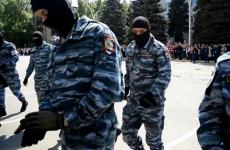The law banning the promotion of non-traditional relationships. The State Duma is offered to increase punishment for propaganda of homosexuality and pedophilia. Prince Harry and Meghan start a new life
The Russian Ministry of Internal Affairs proposed to introduce criminal liability for "propaganda of pedophilia and homosexuality" among minors. According to the TASS news agency, on October 19, at a meeting of the State Duma, Sergei Alabin, head of the department for combating pedophilia of the department for combating crimes against the person of the GUUR, said: "A question was raised about the propaganda of pedophilia, homosexuality, unconventional relationships, and so on. Personally, I I think that administrative responsibility is ineffective. If this is elevated to the rank of criminal responsibility, then we will save our generation, which should not grow up focused on pedophilia and non-traditional relationships. "
And although Russian medicine officially adopts the International Classifier of Diseases (ICD-10), in which homosexuality is not a disease, this does not prevent representatives of the Ministry of Internal Affairs from considering homosexuality as a deviation - on a par with pedophilia.
Anti-gay propaganda law
The criminal article for "sodomy" was abolished in Russia in 1993. And in 2013, the State Duma passed a law establishing administrative responsibility for gay propaganda among children in the form of a fine. It can range from 50 thousand to 1 million rubles.
Recent cases include the case of Evdokia Romanova, a Samara activist. Two years ago, the girl reposted links from The Guardian and BuzzFeed to LGBT topics on Facebook and Vkontakte. On July 26, 2017, the local police station called her and summoned her to the police department to testify in the case of a man whom the girl had never heard of. Despite the suspicious reason for the call, the girl came to the police station, where she was charged with "gay propaganda". The girl admitted to DW that law enforcement officers even threatened her husband, an Austrian citizen, with deportation from Russia. Romanova involved the media and the human rights organization Amnesty International in the case, but a fine for "gay propaganda" could not be avoided. On October 19, a Samara court issued a fine of 50 thousand rubles to Romanova for reposting articles.
What is "propaganda of homosexuality"
Damir Gainutdinov, a lawyer with the Agora human rights organization, believes that there are no criteria for evaluating propaganda in the Russian law, so government agencies have to "get out". From the wording of the Constitutional Court of the Russian Federation, it follows that "propaganda of nontraditional sexual relations" is the dissemination of information that can harm health, moral development and form distorted ideas about the social equivalence of traditional and nontraditional marital relations among minors.
“Roughly speaking, one cannot speak of LGBT normality. At least in the presence of minors,” Gainutdinov interprets the law.
In support of this bill, Roskomnadzor conducted its own research, which it published under the title "The Concept of Information Security for Children." It provides an example that the published statistics of adoption by homosexual and heterosexual couples "form in children and adolescents the idea that a homosexual couple can cope with parental responsibilities just as well as a heterosexual one." According to Roskomnadzor, such information can affect the self-identity of a teenager and is equated with propaganda.
Tanya Lokshina, program director of the Moscow bureau of Human Rights Watch, believes that there are many legislative acts in Russia with "vague" wording. But the law "on gay propaganda" is not vague. "Almost any public positive coverage of LGBT people and relationships can be regarded as propaganda. In theory, this law can be applied to many people. But it is applied selectively," said DW Lokshina.
Violation of the rights of citizens of the Russian Federation
In June 2017, the European Court of Human Rights (ECHR) recognized the 2013 Russian law as discriminatory, and also indicated that it violated the articles of the European Convention on the Protection of Human Rights, namely Article 10 ("Freedom of speech") and Article 4 ( "Prohibition of discrimination").
The prerequisite for such a decision was the appeal to the ECHR of three Russians - activists of the LGBT movement: Nikolai Baev, Alexei Kiselev and Nikolai Alekseev. All three were held accountable for promoting "nontraditional" relations in Russia. The ECHR ordered to pay them compensation in the amount of 50 thousand euros. The Russian Ministry of Justice expressed its disagreement with the decision of the ECHR and promised to appeal against it. If the decision of the ECHR is not implemented, Russia will face fines and a damaged reputation.
Lokshina believes that in this case the Russian Federation has only one way out - to abandon the law on "propaganda of non-traditional relations." However, the activist does not exclude that Russia will only pay compensation to the victims, and leave the law.
The goal is self-censorship
There are not so many precedents for the application of the law. Damir Gainutdinov told DW that during the entire existence of the article, 14 people were brought to justice in the Russian Federation. The lawyer explained that there is discrimination against LGBT people in Russia, but the authorities are not yet ready to take responsibility for this.
Context
"Law enforcers are more focused on extremism, and massive legal persecution of LGBT people is hardly necessary from the point of view of image," Gainutdinov said. According to human rights activist Tanya Lokshina, the relatively small number of precedents is due to selective enforcement in Russia. Its purpose is to create a "self-censorship" effect. People understand that if this happened to someone, it could happen to them.
Lokshina said that while such laws are being discussed and adopted, the number of attacks on LGBT activists in Russia is growing. Anyone who dares to support the ideology or activities of LGBT people can simply be beaten up. “When the state passes a law that actually states that people who are members of the LGBT community are second-class people and are harmful to society, this pushes the growth of homophobic sentiments. On the other hand, it gives a feeling of impunity for aggressive and radical homophobes. Therefore, being LGBT is an activist today - it is unsafe ", - says Lokshina.
See also:
Watch video 03:42
Love is illegal: how to fight homophobia in Russia? (14.10.2017)
-
Politics in pictures
When is protection against coronavirus a fig leaf?
"Adam" and "Eve" with closed sheets, like masks, faces.

Politics in pictures
Could Sherlock Holmes handle the Julian Assange case?
The hearing in London on the extradition of Julian Assange is taking place against the backdrop of protests by his supporters. Caricaturist Sergei Elkin introduced the founder of Wikileaks as a character in stories about Sherlock Holmes.


Politics in pictures
Putin with Lukashenko in Sochi: what arguments will the president of the Russian Federation bring?
The presidents of the Russian Federation and Belarus are holding talks on integration again. More recently, US Secretary of State Pompeo was in Minsk. Sergei Elkin on how Putin is pulling Lukashenka over to his side.

Politics in pictures
How about "Brexit" in Russian fairy tales will be told
The exit of Great Britain from the European Union is an excellent subject for a Russian fairy tale, says cartoonist Sergei Elkin. Boris Johnson - Kolobok, and grandmother - Angela Merkel?

Politics in pictures
US Presidential Election: Socialist Sanders vs. Capitalist Trump?
Senator Bernie Sanders, whom Donald Trump calls a communist, has declared himself the winner of the first Democratic caucuses in Iowa. Portrait of a possible presidential candidate from Sergei Elkin.

Politics in pictures
Coronavirus epidemic: when disease knows no boundaries
The coronavirus, which is home to China, is spreading across the planet. Infection with them is found in more and more countries. Cartoonist Sergei Elkin on the current appearance of the Chinese dragon.

Politics in pictures
Is Vladimir Putin a dove of peace for Libya?
Moscow supported one of the conflicting parties in Libya. The Kremlin has now become a peace negotiator. Sergei Elkin on the new role of Vladimir Putin.

Politics in pictures
Prince Harry and Meghan start a new life
Prince Harry and his wife Meghan have decided to step down from their main royal duties. Cartoonist Sergei Elkin on the new priorities of one of the heirs to the British throne.

Politics in pictures
The assassination of Soleimani and the new role of Donald Trump
By ordering the assassination of Iranian General Qasem Soleimani, US President Donald Trump appears to have considered himself a real god of war, cartoonist Sergei Elkin suggests.

Politics in pictures
Oil supplies from Russia to Belarus: how Putin lures Lukashenko
Russia has cut off oil supplies to Belarus since the beginning of 2020. No further supply contracts have been concluded yet. Sergei Elkin on a new round of bargaining between Putin and Lukashenko.

Politics in pictures
Gas Transit Treaty: Russian-Ukrainian Contact Pipes
Russia and Ukraine, after lengthy negotiations, have reached an agreement in principle on gas transit. Details of the deal will be announced later. Sergei Elkin on the successful completion of a months-long saga.

Politics in pictures
How Greta Thunberg rode German trains
A Swedish eco-activist posted a photo of her sitting in the vestibule of a German train on the floor. Deutsche Bahn doubted that Greta did not get a place. It reminded Sergei Elkin of a famous cartoon.
 NATO 70th Anniversary Summit: Does Alliance Threatened "Brain Death"?
NATO 70th Anniversary Summit: Does Alliance Threatened "Brain Death"?
Summit dedicated to the 70th anniversary of NATO starts in London. Although French President Emmanuel Macron announced the alliance's "brain death", cartoonist Sergei Elkin is confident that this is still a long way off.

Politics in pictures
Will Putin be able to lure Lukashenka into an integration union?
Alexander Lukashenko is in no hurry to sign an agreement on the integration of Belarus and Russia. Cartoonist Sergei Elkin on Vladimir Putin's persuasion.

Politics in pictures
Turkey's military operation in Syria: what's on Erdogan's mind?
Turkey launched a military operation in northern Syria. Ankara has announced that it wants to create "security zones" there and resettle the refugees. Sergei Elkin doubts Erdogan's noble impulse.

Politics in pictures
USA vs. China: Huawei stumbling
Washington accuses the Chinese concern Huawei of industrial espionage and blacklisted the company. Beijing is protesting. Cartoonist Sergei Elkin on the economic disputes between the United States and China.

Politics in pictures
Dirty oil from Russia: friendship is friendship, and transit will be suspended
Belarus has completely stopped receiving contaminated oil coming from Russia through the Druzhba pipeline. Sergei Elkin - on the reaction of Minsk to a man-made accident in the Russian Federation.
(Code of Administrative Offenses of the Russian Federation edition 2018-2019)
Administrative Offenses Code
Article 6.21. Promotion of non-traditional sexual relations among minors
(introduced by the Federal Law of June 29, 2013 N 135-FZ)
1. Propaganda of non-traditional sexual relations among minors, expressed in the dissemination of information aimed at the formation of non-traditional sexual attitudes among minors, the attractiveness of non-traditional sexual relations, a distorted idea of the social equivalence of traditional and non-traditional sexual relations, or the imposition of information about non-traditional sexual relations that arouses interest in such relations, if these actions do not contain a criminal offense, -
shall entail the imposition of an administrative fine on citizens in the amount of four thousand to five thousand rubles; for officials - from forty thousand to fifty thousand rubles; for legal entities - from eight hundred thousand to one million rubles or administrative suspension of activities for up to ninety days.
2. The actions provided for by part 1 of this article, committed with the use of mass media and (or) information and telecommunication networks (including the Internet), if these actions do not contain a criminal offense, -
shall entail the imposition of an administrative fine on citizens in the amount of fifty thousand to one hundred thousand rubles; for officials - from one hundred thousand to two hundred thousand rubles; for legal entities - one million rubles or administrative suspension of activities for up to ninety days.
3. The actions provided for in part 1 of this article, committed by a foreign citizen or stateless person, if these actions do not contain a criminal offense, -
shall entail the imposition of an administrative fine in the amount of four thousand to five thousand rubles with administrative expulsion from the Russian Federation or administrative arrest for up to fifteen days with administrative expulsion from the Russian Federation.
4. Actions provided for by Part 1 of this Article, committed by a foreign citizen or stateless person using the mass media and (or) information and telecommunication networks (including the Internet), if these actions do not contain a criminal offense, -
shall entail the imposition of an administrative fine in the amount of fifty thousand to one hundred thousand rubles with administrative expulsion from the Russian Federation or administrative arrest for up to fifteen days with administrative expulsion from the Russian Federation.
- Suponina Elena Alexandrovna, Ph.D., Associate Professor, Senior Lecturer
- Voronezh Institute of the Ministry of Internal Affairs of the Russian Federation
- DRAFT LAW No. 957581-6
- MINORS
- ADMINISTRATIVE OFFENSES
- ADMINISTRATIVE RESPONSIBILITY
- CODE ON ADMINISTRATIVE OFFENSES
- PROMOTING UNCONVENTIONAL SEXUAL RELATIONS
In the article, the author analyzes the administrative-tort norms that establish responsibility for the promotion of non-traditional sexual relations among persons under the age of majority. Prospects for toughening such liability are being considered.
- On the question of the legality of the presence of absolutely definite sanctions in the domestic administrative-tort legislation
- On the prospects for improving Russian legislation in the field of combating violence in the family and domestic sphere
- On the issue of administrative responsibility for the illegal dissemination of information about a minor who has suffered as a result of a wrongful act
- On the issue of administrative responsibility of parents (other legal representatives) of minors for violation of the "children's curfew"
- On administrative responsibility for parking in a parking lot located on a public territory with missing or illegible state registration plates
The basic requirements for ensuring the safety of persons under the age of majority in terms of disseminating information about non-traditional sexual relations are contained in the provisions of the Federal Law of December 29, 2010 No. 436-FZ "On the Protection of Children from Information Harmful to Their Health and Development." Clause 4 of Part 2 of Article 5 of the said law includes information that denies family values, promotes non-traditional sexual relations and forms disrespect for parents and (or) other family members as information prohibited for dissemination among children.
Federal Law No. 135-FZ of June 29, 2013, the main regulatory legal act regulating issues of administrative responsibility in the country - the Code of Administrative Offenses of the Russian Federation (hereinafter referred to as the Code of Administrative Offenses of the Russian Federation), was supplemented by Article 6.21 (“Promotion of non-traditional sexual relations among minors "). Prior to the consolidation of the relevant norms at the federal level, a number of constituent entities of the Russian Federation adopted laws on administrative responsibility for the promotion of pedophilia, homosexuality, bisexuality and transgenderness among minors.
So, on May 24, 2006, the Ryazan Region Duma supplemented the local Law on Administrative Offenses with Article 3.10. ("Public actions aimed at promoting homosexuality (sodomy and lesbianism) among minors"); The Law of the Arkhangelsk Region No. 336-24-OZ of September 30, 2011 prohibited the conduct of public actions aimed at promoting homosexuality among minors; On December 27, 2011, deputies of the Kostroma Regional Duma supplemented the law “On guarantees of the rights of the child” and the local Code of Administrative Offenses with articles on the prevention of public actions aimed at promoting pedophilia, homosexuality (sodomy and lesbianism), bisexuality and transgender among minors. Similar changes and additions were adopted in St. Petersburg, Novosibirsk Oblast, Magadan Oblast, Samara Oblast, Krasnodar Krai, Republic of Bashkortostan, Kaliningrad and Irkutsk Oblasts.
In addition, such initiatives were widely discussed in the legislative bodies of the Moscow region, the Republic of Sakha (Yakutia), the Kirov and Vladimir regions, as well as the Perm region. However, in connection with the entry into force of the Federal Law of June 29, 2013 No. 135-FZ, these legislative initiatives have lost their relevance, since the legislator of a constituent entity of the Russian Federation, establishing administrative responsibility for certain administrative offenses, is not entitled to invade the spheres of public relations, the regulation of which is the subject of jurisdiction of the Russian Federation, as well as the subject of joint jurisdiction if there is federal regulation on this issue.
It should be noted that regional laws that banned the promotion of non-traditional sexual relations among adolescents were immediately subjected to not only informational, but also legal attacks from individuals and organizations, both domestic and foreign.
In particular, in 2009 gay activists, citizens of Russia N.V. Baev and I.B. Fedotov held single protest actions (pickets) near schools in the city of Ryazan and near the Ryazan Regional Children's Library with posters “I am proud of my homosexuality. Ask me about it ”and“ Homosexuality is normal ”. They were detained and found by the court guilty of violating regional law. Gay activists filed a complaint with the Constitutional Court of the Russian Federation, which on January 19, 2010 issued a ruling No. 151-O-O on this fact. This definition, in particular, states that the "Laws of the Ryazan Region" On the Protection of the Morality of Children in the Ryazan Region "and" On Administrative Offenses "do not establish any measures aimed at prohibiting homosexuality or its official censure, do not contain signs discrimination, in their meaning, do not allow excessive actions of public authorities. Accordingly, the provisions of these laws contested by the applicants cannot be regarded as disproportionately restricting freedom of speech. ”
After the ruling of the Constitutional Court of the Russian Federation N.V. Baev filed a complaint with the European Court of Human Rights, and I.B. Fedotov - to the UN Human Rights Committee, which in October 2012 satisfied the complaint of the latter, recognizing the provisions of the Ryazan Region law prohibiting the promotion of homosexual relations among minors, contrary to two articles of the International Covenant on Civil and Political Rights. At the end of 2013, the Ryazan Regional Court overturned the decision to bring Fedotova to administrative responsibility, and later the verdict of the regional court was approved by the Supreme Court of the Russian Federation. Moreover, in May 2014 the magistrate of the judicial district No. 423 of the Tverskoy district of the city of Moscow S.The. Komlev partially satisfied the claim of I.B. Fedotova, deciding to recover from the Ministry of Finance of the Russian Federation eight thousand rubles of moral and material damage in connection with the illegal bringing her to administrative responsibility for gay propaganda in Ryazan. This was the first time in Russian jurisprudence when a decision to pay compensation to a gay activist was made by a Russian court, and not by the European Court of Human Rights.
Similar "actions of disobedience" took place in a number of other subjects of the Federation. The most widespread public resonance was acquired by the incident with the arrest and bringing to administrative responsibility of the well-known Russian LGBT activist N.A. Alekseev, who unfolded a poster on the square near the administration of St. Petersburg with the inscription: “Homosexuality is not a perversion. Perversion is field hockey and ice ballet. " To prove that these actions concerned minors, the court accepted statements from citizens, which indicated that they were with their children at the time of the action. ON. Alekseev also appealed against his being brought to administrative responsibility in the European Court of Human Rights.
In connection with the above, a completely reasonable question arises: how legitimate and consistent with the realities of today is the norm enshrined in Article 6.21 of the Administrative Code of the Russian Federation? Let's figure it out.
The key point of the objective side of the analyzed offense is the concept of "non-traditional sexual relations", that is, sexual relations associated with retreat, rejection of traditions that have developed and rooted in a particular society, in a particular historical period. Obviously, this concept is very changeable in the historical perspective and cannot be unambiguously interpreted by the legal systems of different countries and peoples.
In contrast to the United States and Western Europe, in which the liberalization of sexual morality is developing, in many countries of the rest of the world, a completely opposite trend is taking place. India reinstated criminal liability for homosexuality at the end of 2013. In Brunei, a new Sharia-based Penal Code came into force in May 2014, under which homosexual men and women face severe punishment, including stoning to death. The Gambia has passed a life imprisonment law for homosexuals. In Malaysia, sodomy, or "indecency committed with another male," carries a penalty of up to twenty years in prison, a fine and flogging. In Jamaica, homosexual relationships are punishable by ten years in prison. Aggregated data show that of the United Nations Member States, in 2014, seventy-eight countries retained a legal assessment of same-sex contacts as illegal, while five countries (Iran, Yemen, Mauritania, Saudi Arabia, Sudan), as well as in some regions Nigeria and Somalia were punished with the death penalty.
As for the Russian Federation, then (as the results of sociological surveys show), in our society, in general, they are very cool towards the supporters of non-traditional sexual orientation. At the same time, it should be noted that, despite the idea of unacceptability of same-sex marriages for Russia, which can be traced in legislation, judicial practice and political and legal thought, the current Russian legislation does not contain a clear prohibition on the conclusion of such marriages. As noted by E.A. Isayev, in fact, these relations remain outside the scope of legal regulation.
Thus, Russia does not legally prohibit non-traditional sexual relations, does not prosecute citizens for their adherence to one way or another of satisfying sexual desire. The establishment of administrative responsibility in Article 6.21 of the Code of Administrative Offenses of the Russian Federation does not indicate the existence in our country of an absolute ban on nontraditional sexual relations in the general system of legal regulation. It only affects the prohibition on the commission of public actions that are aimed at promoting such relationships among adolescents, and is motivated by the fact that persons who have not reached the age of majority, due to their mental and physical immaturity, need special care and protection, including proper legal protection.
In this regard, the Supreme Court of the Russian Federation, in its ruling dated February 27, 2013, No. 46-APG-13-2, rightly pointed out that the factors and life circumstances from which a child should be protected are determined by the priority goals of protecting the legitimate interests of the child and are formulated in national law, taking into account international norms, universally recognized principles of international law and among them includes information that denies family values, information that can harm the health, moral and spiritual development of minors.
On December 18, 2015, a group of deputies submitted to the State Duma a draft federal law No. 957581-6 "Code of Administrative Offenses of the Russian Federation", in which its authors provided for tougher penalties for certain administrative offenses that infringe on the family and the rights of minors, including this toughening touched upon unlawful acts related to the promotion of non-traditional sexual relations among minors (parts 1, 2 and 3 of article 10.15 of the bill).
So, according to part 1 of Article 10.15, the administrative fine for individuals is set in the amount of 5,000 to 10,000 rubles (in the Code of Administrative Offenses of the Russian Federation - from 4,000 to 5,000 rubles), for officials - from 50,000 to 60,000 rubles, (in the Code of Administrative Offenses of the Russian Federation - from 40,000 up to 50,000 rubles); under part 2 of article 10.15, an administrative fine for officials - from 200,000 to 300,000 rubles or disqualification for a period of 6 months to 1 year (in the Code of Administrative Offenses of the Russian Federation - from 100,000 to 200,000 rubles); under part 3 of article 10.15 - an administrative fine from 5,000 to 10,000 rubles (in the Code of Administrative Offenses of the Russian Federation - from 4,000 to 5,000 rubles).
The author is well aware that it is impossible to solve all the problems voiced in this article by only mechanical increase in penalties. But the fact that such an increase is fully justified is today obvious for both the legislator and the law enforcement officer.
Bibliography
- Federal Law of December 29, 2010 No. 436-FZ (as amended on June 29, 2015) "On the Protection of Children from Information Harmful to Their Health and Development" / [Electronic resource] - Access mode. - URL: www.base.consultant.ru (date of access: 01.10.2016).
- Federal Law of June 29, 2013 No. 135-FZ "On Amendments to Article 5 of the Federal Law" On the Protection of Children from Information Harmful to Their Health and Development "and certain legislative acts of the Russian Federation in order to protect children from information that promotes the denial of traditional family values "/ [Electronic resource] - Access mode. - URL: www.base.consultant.ru (date of access: 01.10.2016).
- The Code of the Russian Federation on Administrative Offenses of 12/30/2001 No. 195-FZ (as amended on 07/06/2016) / [Electronic resource] - Access mode. - URL: www.base.consultant.ru (date of access: 01.10.2016).
- Determination of the Constitutional Court of the Russian Federation of January 19, 2010 No. 151-O-O "On the refusal to accept for consideration the complaint of citizens Nikolai Aleksandrovich Alekseev, Nikolai Viktorovich Baev and Irina Borisovna Fedotova on violation of their constitutional rights by Article 4 of the Law of the Ryazan Region" On the Protection of Morality children in the Ryazan region "and article 3.10 of the Law of the Ryazan region" On administrative offenses "/ [Electronic resource] - Access mode. - URL: www.base.consultant.ru (date of access: 01.10.2016).
- International Pact of 12/16/1966 "On civil and political rights" / [Electronic resource] - Access mode. - URL: www.base.consultant.ru (date of access: 01.10.2016).
- Romanovsky G.B. On the prohibition of propaganda of non-traditional sexual relations // Citizen and Law. 2014. No. 1. S. 3-15.
- Tikhomirov D.A. Liberalization of sexual morality in the modern world // Knowledge. Understanding. Skill. 2015. No. 3. S. 93-108.
- Ananskikh I.A., Chernova O.Yu. Same-sex marriage - politics or law? Western experience and Russian assessment // World of Politics and Sociology. 2016. No. 2. S. 109-115.
- Isaeva E.A. Same-sex couples and children: aspects of British and American legislation // Socio-legal notebook. 2012. No. 2. S. 138-147.
- Determination of the Supreme Court of the Russian Federation dated February 27, 2013 No. 46-APG13-2 "On the cancellation of the decision of the Samara Regional Court dated November 13, 2012 in terms of invalidating certain provisions of paragraphs 2 - 9 of Article 11.2 of the Samara Region Law dated November 1, 2007 No. 115-GD" On administrative offenses on the territory of the Samara region "/ [Electronic resource] - Access mode. - URL: www.base.consultant.ru (date of access: 01.10.2016).
- Bill No. 957581-6 Code of the Russian Federation on Administrative Offenses // Official site of the State Duma of the Federal Assembly of the Russian Federation / [Electronic resource] - Access mode. - URL: www.base.consultant.ru (date of access: 01.10.2016).
MOSCOW, June 30 - RIA Novosti. Russian President Vladimir Putin signed a law banning gay propaganda among children. The corresponding document was published on the official portal of legal information on Sunday.
According to the document, for the propaganda of non-traditional sexual relations among children, a fine is set for citizens in the amount of 4 thousand to 5 thousand rubles, for officials - from 40 thousand to 50 thousand rubles, for legal entities - from 800 thousand rubles to one million rubles. Also, a violation may entail an administrative suspension of the activities of legal entities for up to 90 days.
The punishment for such propaganda using the media or the Internet will be tougher. The fine for citizens will be from 50 thousand to 100 thousand rubles, for officials - from 100 thousand to 200 thousand rubles, and for legal entities - a million rubles or suspension of activities for up to 90 days.
How did the ban on promoting homosexuality come about?
On March 30, 2012, a law banning the promotion of homosexuality and pedophilia among minors came into force in St. Petersburg, which gathered a huge number of both supporters and opponents. Violators of the law will be punished with fines ranging from 5 to 500 thousand rubles.
How other countries reacted to the decision of Russian legislators
The German government hopes that Russia will abandon the idea of introducing responsibility for the promotion of non-traditional sexual relations. “We do not give up hope that the Russian state and the Duma will annul this decision,” said the spokesman for the Cabinet of Ministers of the Federal Republic of Germany, Steffen Seibert.
"My child - I do what I want"
Ali and Chris are unschoolers: their children will not go to kindergarten or school and will learn everything at home - through the experience gained in everyday life. Frank and Elizabeth are parents of five and adherents of "natural parenting": they are sure that home birth, breastfeeding up to four years of age and the longest possible physical contact between parents and children are the key to good health and harmonious mental development. Gina and John give their sons dolls, allow them to try on clothes from their mother's wardrobe, and instill a love of cooking. In their house, man and woman are equal: children see that mom can hammer in a nail, and dad can do the laundry. They raise their boys outside the gender system.
Will such non-traditional parenting prepare children for life in a real society?
Where same-sex marriage is legalized in the world
The first country to legalize same-sex marriage was the Netherlands. The law allowing same-sex marriage and adoption of children by such families has been in force since April 2001. To exercise this right, however, some restrictions have been introduced. Homosexuals can enter into a civil marriage through the usual ceremony at the mayor's office, just like heterosexual couples. When such marriages are concluded between people who are not Dutch nationals, one of them must be permanently and legally resident in the Netherlands. Mayors also have the right to refuse to register such marriages.
The tougher punishment for insulting the feelings of believers, the fight against Internet piracy and the ban on adoption of children by same-sex couples are the most resonant bills adopted during the spring session of parliament -






